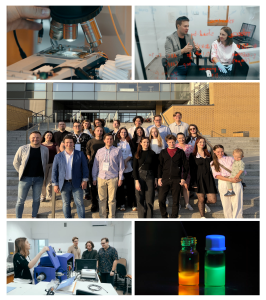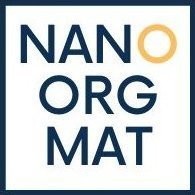Welcome to the NanoOrgMat group website!
| Nanotechnology is an area of research that seeks to understand and gain control of matter at scale of individual molecules. Research in this area allows us to gain a deeper understanding of the nature of life, develop modern therapies, test physical theories or create nanomaterials that control light.
The NanoOrgMat group focuses on the intersection of organic chemistry and nanomaterials, aiming to develop advanced nanomaterials with significant potential applications in photonics, such as next-generation displays, and in medicine, including novel biosensors. We specialize in designing organic compounds that enhance the durability, stability, and biocompatibility of metallic and semiconductor nanoparticles, facilitating specific interactions with biomolecules. A major highlight of our work is the exploration of material chirality. With precisely designed and synthesised components, we have created materials that spontaneously form chiral spring-like nanostructures with controlled handedness. This method was recognised with a National Science Centre Award. In addition to their beautiful structure, our chiral nanomaterials exhibit a strong interaction with circularly polarised light. We have pioneered methods to create thin-film chiral materials using liquid crystals, enabling the development of chiral pixels through laser photothermal writing. These pixels can encode images with precise optical properties in microscale! Our group has also made significant strides in creating chiral plasmonic materials by engineering gold nanoparticles with chiral morphology or incorporation of plasmonic nanoparticles in the liquid crystalline matrices. Those approaches enabled chiral plasmonic materials, shifting chiroptical properties of the materials to UV-Vis-NIR regime and whose structure and properties can be dynamically altered using temperature and UV light. This opens new avenues in enantiomer recognition, chiral catalysis, development of faster data transfer or 3D imaging technologies.. Our students have received numerous accolades, including best poster awards at prestigious conferences like MATSUS24 and ILCC24, and scholarships such as the START Scholarship from the Foundation for Polish Science (4 recipients in last 5 years) and the Minister’s Scholarship for Outstanding Young Scientists (3 recipients in last 5 years). This year, we have successfully secured three new grants to further our research, including the Proof of Concept and First Team grants from the Foundation for Polish Science and a NAWA grant from the National Science Centre. |
 |
